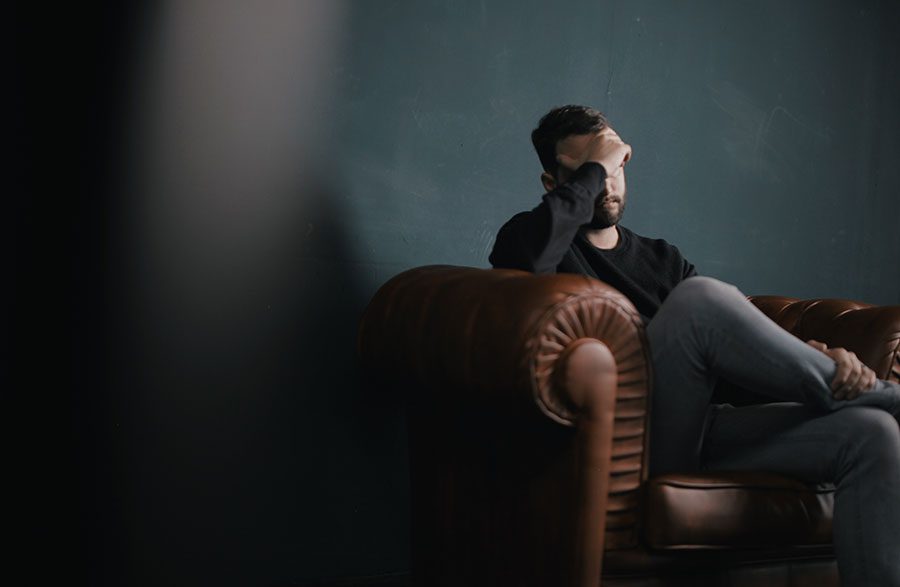
Today’s addiction recovery specialists understand that relapse is a common part of the recovery process. And while many journeys to lasting sobriety might involve a speed bump or two, one of the best ways you can protect yourself against substance abuse relapse is to learn more about it.
So, what are common relapse triggers for addicts? Learn more about the common types of addiction relapse triggers and the 3 stages associated with it below.
The 4 most common types of addiction relapse triggers
1 | The Overwhelmed Relapse

Addiction doesn’t happen overnight, nor does recovery. Just as it implies, the overwhelmed relapse occurs when someone in recovery encounters significant stressors that bring more and more pressure.
Chances are, your new life of sobriety may involve locating a new place to live, finding a different job, and potentially recruiting a new set of friends.
Alone, each of those can cause strain and make days a little more difficult. Together, however, the challenges can feel insurmountable if you don’t have the coping skills or support network to process them.
2 | The All-Or-Nothing/Perfectionism Relapse

Many of us struggle to avoid black-and-white, all-or-nothing thinking, e.g., I’m a failure, I’m selfish, etc.
But thinking in these terms lays the groundwork for turning the smallest mistake into a recipe for relapse. To try to prevent the perfectionism relapse, strive to set realistic goals.
Rather than hoping for happier days, establish a plan for how you’ll handle days that don’t go as planned. And if you do relapse, make a conscious effort to not feel inadequate; instead, just acknowledge that you experienced a minor (and temporary) setback.
3 | The Peer or Social Pressure Relapse

Pressure from places and people around you can weigh heavily on your goals to stay sober. Especially early on in your recovery, you can help avoid peer/social pressure relapse by steering clear of places and people that remind you of times when you were using drugs or alcohol.
Skip the after-work happy hour, find a new route home that doesn’t take you right past your neighborhood liquor store, head out for a hike with a good friend instead of attending the neighborhood party.
Relaxation exercises such as mindfulness meditation can also help with peer pressure or urges(1).
4 | The Avoidance Relapse
Avoidance relapse occurs when you focus on any distraction other than putting the time and effort into furthering your recovery goals.
Individuals experiencing avoidance relapse distract themselves with virtually anything else, so long as it occupies them enough to skip support meetings (or attend but not actively participate), find ways to isolate themselves, or otherwise dodge the task of working on their recovery.
Many of those who encounter the avoidance relapse are overconfident in their abilities to stay sober and often feel like they’ve “already beat” addiction.
Tips for Preventing Addiction Relapse
Triggers that lead to relapse can be different for everyone, but again, the best defense against the pulls of addiction is knowledge and awareness.
Increase chances for success by:
- Gaining insight into your emotions and tracking what triggers you to want to use drugs or alcohol again. Learn to acknowledge uncomfortable emotions and find healthier coping skills when those feelings occur.
- Resisting the urge to isolate yourself from family and friends when you’re struggling. Instead, seek support, whether that’s through formal 12-step program meetings or just reaching out to a trusted friend or family member who knows what you’re going through.
- Showing yourself a little compassion. Go ahead, grant yourself the same grace you’d show a good friend.
- Reminding yourself that recovery is a lifelong process, and progress is more important than perfection.
If you or someone you care about is struggling with recovery from drug and alcohol addiction, contact the Substance Abuse and Mental Health Services Administration (SAMHSA) National Helpline at 1-800-662-4357 for information on support and treatment facilities in your area.
Or, please reach out directly. Choice House is a Colorado treatment center with an admissions director ready to talk to you about treatment options for lasting sobriety.
Article Sources
- Priddy SE, Howard MO, Hanley AW, Riquino MR, Friberg-felsted K, Garland EL. Mindfulness meditation in the treatment of substance use disorders and preventing future relapse: neurocognitive mechanisms and clinical implications. Subst Abuse Rehabil. 2018;9:103-114. doi:10.2147/SAR.S145201
Additional reading:
Triggers in Recovery from Dr. Holly
